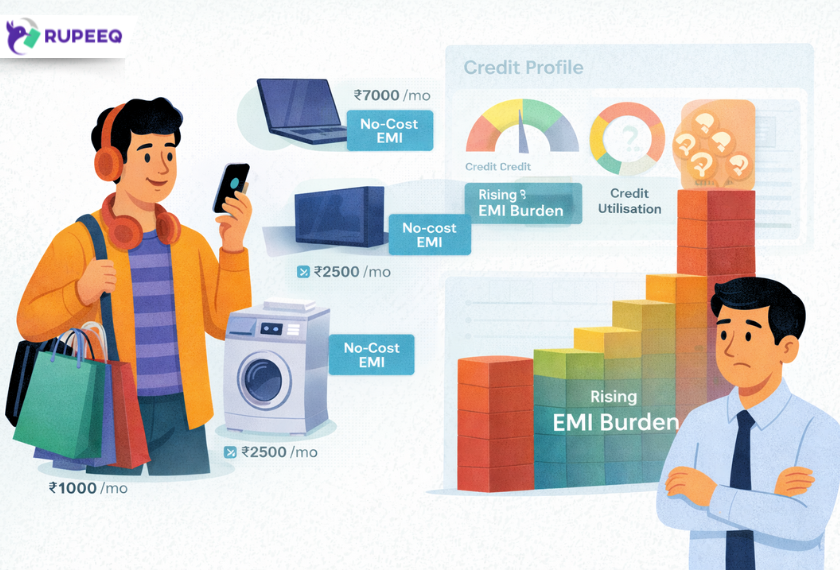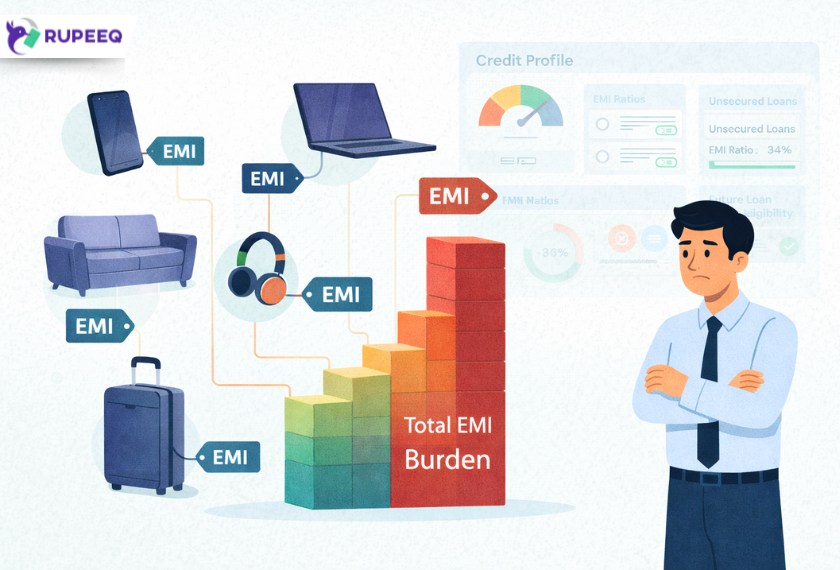Your credit score is a key financial metric that lenders use to assess your creditworthiness. Whether you’re applying for a personal loan, credit card, or any other financial product, your credit score plays a crucial role in determining your eligibility and the terms offered to you. Checking your credit score regularly is an essential step toward maintaining good financial health.
In this blog, we’ll guide you on how to check your credit score for free in India, explain the difference between hard queries and soft queries, and highlight how you can check your score with RupeeQ without affecting it.
What Is a Credit Score?
A credit score is a three-digit number, typically ranging from 300 to 900, that reflects your creditworthiness. It is calculated based on factors like your payment history, credit utilization, length of credit history, and types of credit accounts.
Importance of a Good Credit Score:
- Higher Loan Approval Chances: A score above 750 increases your chances of loan approval.
- Better Interest Rates: A higher score often leads to lower interest rates on loans and credit cards.
- Improved Negotiating Power: Strong credit profiles allow you to negotiate better terms with lenders.
How to Check Your Credit Score for Free in India
You can check your credit score for free by using any website which is partnered with a credit bureau that does assessment of your credit profile. At RupeeQ you can check your credit score for free without making any dent to your credit score. Read on to know how:
Steps to Check Your Credit Score via RupeeQ:
- Visit RupeeQ’s Credit Score Page: Go to the Free Credit Score section on the RupeeQ website.
- Provide Basic Details: Enter essential information such as your name, email ID, mobile number, PAN card, and date of birth.
- Authenticate Your Identity: Verify your identity through an OTP sent to your registered mobile number.
- View Your Credit Score: Once verified, RupeeQ retrieves your credit score from credit bureaus using a soft query, which does not harm your score.
- Analyze Your Report: Along with your credit score, you’ll get insights into factors influencing it, helping you improve where necessary.
RupeeQ Tip: Checking your credit score via RupeeQ is free, quick, and safe. It’s a soft query, so you can check it as often as needed without impacting your creditworthiness. With RupeeQ ACE you will also get an Advanced Credit Evaluation of your credit worthiness!
Difference Between Hard and Soft Queries
Understanding the difference between hard and soft queries is crucial to managing your credit score effectively.
What is a Soft Query?
- Definition: A soft query, also known as a soft inquiry, occurs when you or an authorized platform like RupeeQ checks your credit score for informational purposes.
- Impact on Credit Score: No impact.
- Examples:
- Checking your own credit score
- Pre-approved loan or credit card offers
What is a Hard Query?
- Definition: A hard query occurs when a lender pulls your credit report to assess your eligibility for a loan or credit card.
- Impact on Credit Score: Multiple hard queries in a short time can lower your credit score.
- Examples:
- Loan application
- Credit card application
Why Soft Queries Are Safer?
Soft queries are non-intrusive and do not reflect on your credit report, allowing you to monitor your score without any repercussions. On the other hand, hard queries indicate active credit-seeking behavior, which can make lenders cautious.
Benefits of Checking Your Credit Score Regularly
1. Monitor Your Financial Health
Regularly checking your score helps you track your credit behavior and take corrective actions when needed.
2. Spot Errors Early
Sometimes, errors in credit reports can harm your score. By checking frequently, you can identify and dispute inaccuracies.
3. Prepare for Loan Applications
Knowing your credit score in advance allows you to strengthen your credit profile before applying for loans or credit cards.
4. Avoid Surprises
A sudden drop in your credit score can indicate issues like unauthorized credit activity or identity theft.
How Credit Score Is Calculated
Credit bureaus like CRIF High Mark calculate your score based on the following factors:
- Payment History (35%): Timely repayment of loans and credit card bills positively impacts your score.
- Credit Utilization (30%): Keeping your credit card usage below 30% of your limit shows financial discipline.
- Credit Age (15%): Older credit accounts contribute positively to your score.
- Credit Mix (10%): A balanced mix of secured (e.g., home loans) and unsecured (e.g., personal loans) credit is beneficial.
- New Credit Inquiries (10%): Avoid frequent hard queries, as they can lower your score.
6. What to Do After Checking Your Credit Score
Once you’ve checked your credit score, follow these steps to improve or maintain it:
If Your Score is 750 and Above:
- Maintain healthy credit habits like on-time payments and low credit utilization.
- Apply for loans or credit cards confidently.
If Your Score is 600–749:
- Pay off outstanding debts and avoid new credit inquiries.
- Opt for smaller loans and repay them on time to build your credit history.
If Your Score is Below 600:
- Focus on clearing overdue amounts.
- Avoid applying for multiple loans or credit cards.
RupeeQ Tip: Use RupeeQ to explore small-ticket personal loans under 50000 or secured credit cards to rebuild your credit score.
Final Thoughts on Checking Free Credit Score
Checking your credit score regularly is a smart financial habit that keeps you informed and prepared. With RupeeQ, you can check your score for free, without affecting it, thanks to soft queries. Additionally, you gain valuable insights into your financial health and tips to improve your creditworthiness.
Take charge of your financial future today! Visit RupeeQ to check your credit score for free and stay one step ahead in achieving your financial goals.







